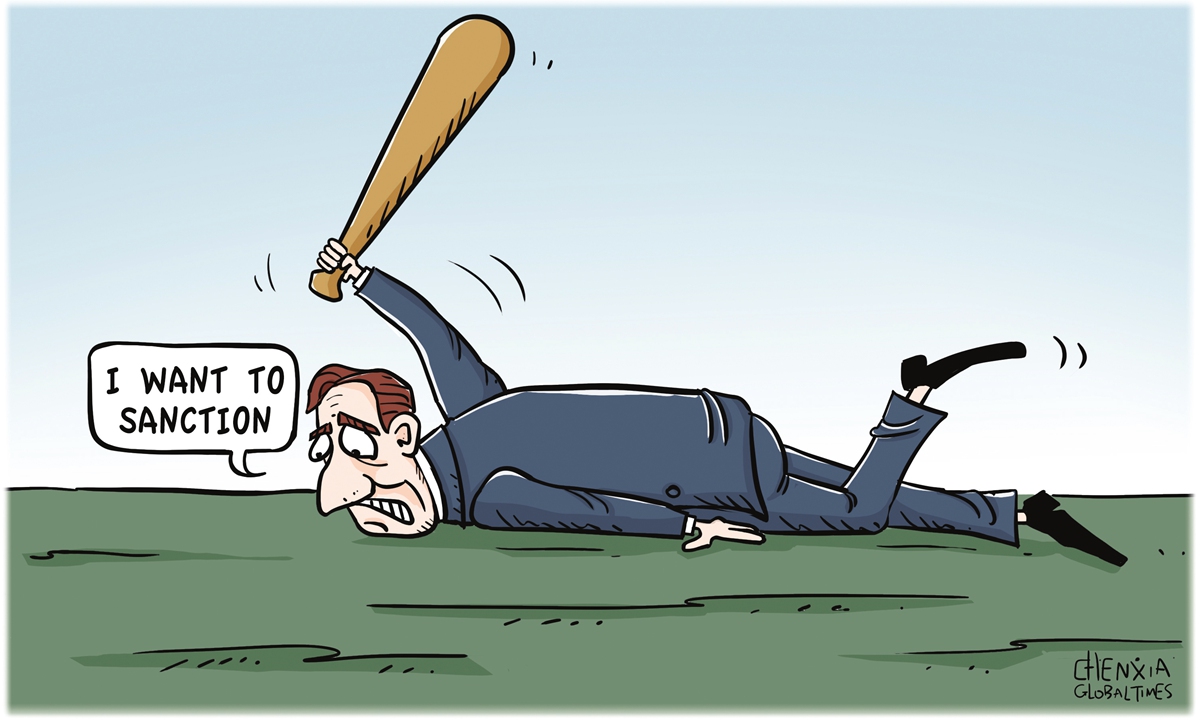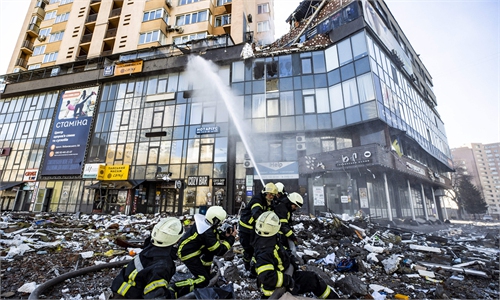
Illustration: Chen Xia/GT
Click here to stay tuned with our live updates on Ukraine tensions.The political influence of the current escalation of the Russia-Ukraine conflict has gone beyond Eurasia.
The secessionist forces in the island of Taiwan have been clamoring that the Chinese mainland will take advantage of the crisis to use force against them, turning the island into the "next Ukraine," in an attempt to fan the flames of the Taiwan people's vigilance against the mainland, as well as to seek "support" from the international community in general and the US-led Western world in particular.
In the US, discussions about Taiwan are also emerging. Some believe that the island is not the Ukraine and that it is more important in terms of economy, geopolitics, supply chain and connection with the West. Therefore, they tend to think Taiwan's business is equivalent to US' business, or the "business of democracy." Some even argue the US should prepare for dealing with both China and Russia simultaneously.
Due to their hype, the Ukraine crisis has, to some extent, become a matter of the Taiwan island, with an attempt to increase the cost of the Chinese mainland in future moves.
The more the US hypes up the Taiwan question during the Ukraine crisis, the more it shows relevant US political forces' anxiety and powerlessness to stop the trajectory of the cross-Straits relations tilting toward the Chinese mainland.
China will eventually realize its national reunification. If the West sanctions and intimidates China at that time, it will show that the West has underestimated the determination and ability of China to achieve its reunification. The island of Taiwan is not Ukraine. The two are not comparable. The reason is not that the island is economically or politically significant. The Taiwan question is China's own internal affair, and there is no room for foreign forces to bargain or intervene. The determination of the Chinese government is unshakable to firmly safeguard China's national sovereignty and territorial integrity and to realize its national reunification.
The price the West will have to pay for its sanctions against Russia is different from that for its sanctions, if any, against China. China is the world's second-largest economy. Quite some economists predict that China could overtake the US as the world's largest economy within a decade. It is the largest trading partner of most countries worldwide, with an irreplaceable position in the global industrial chain, supply chain, value chain, and regional and global influence. Any severe sanction against China will significantly backfire. It will be a lose-lose situation from any point of view. The question is whether the island of Taiwan is important enough for the West to squander decades of economic gains, which the welfare of their people depend on. It is well known that the West is "turning inward," focusing more on domestic affairs and not devoting too much attention and resources to international affairs. This makes the notion of severing ties with China for the sake of the island of Taiwan even more extreme.
Besides, China has the capacity and moral foundation to deal with possible Western sanctions. Admittedly, the Ukraine crisis shows a worrying trend in which the US and the West are increasingly rallying against their geopolitical and security adversaries. Any wise decision should include an anticipation of and response to any possible outcome of sanctions by the US and the West.
China is preparing political, economic, legal and other means to counter external sanctions - the country previously accumulated experience in dealing with the trade war that the US launched against China under the Trump administration. We should be confident in the Chinese government's ability to deal with external pressure and know that anyone who cracks down on China will have to pay a huge price that they simply cannot afford.
It is not objective for Western observers to preemptively blame the Chinese mainland for any conflict across the Taiwan Straits. As is known to all, the Chinese government's position on the Taiwan question has always been clear - under the one-China principle, the two sides can talk and would not necessarily resort to war.
The current reality is that the Tsai Ing-wen authority refuses to acknowledge the 1992 Consensus, constantly provoking the bottom line of the one-China principle and relying on the US to contain China in its secessionist pursuit. This is also the root cause of the tension across the Taiwan Straits. The Chinese government and people seek peace across the Straits with the utmost goodwill and restraint, but the use of force will not be renounced to resolve issues against rampant secessionist forces both on and outside the island.
Therefore, even if some countries would want to impose sanctions on China in the future, they will not necessarily win the support of most countries in the world. The international community will make its own just judgment.
The author is deputy director of the Department for Asia-Pacific Studies at the China Institute of International Studies. opinion@globaltimes.com.cn



